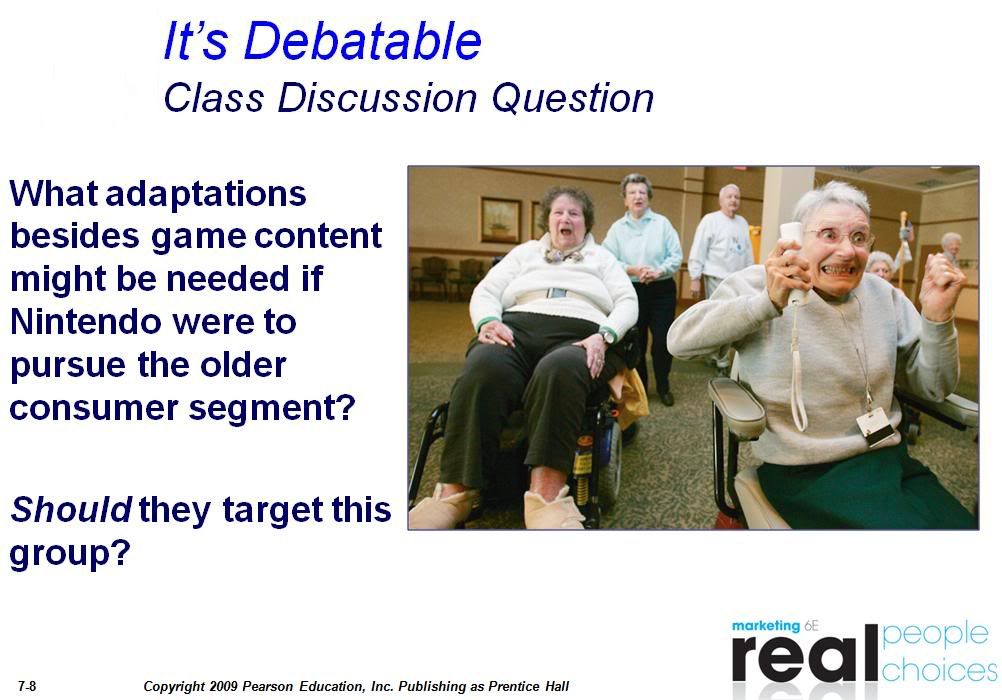This post has not been edited by the GamesBeat staff. Opinions by GamesBeat community writers do not necessarily reflect those of the staff.
Editor's note: The responses of some of Rachel's classmates are both frightening and indicative of how non-gamers are so far removed from gaming culture in general. I certainly hope that none of these people ever become marketers for the video-game industry. -Jay
 Five weeks ago, I began my final quarter of college. Thanks to some careful planning, I’m coasting with a reduced course load. My easiest class is Marketing 202, a freshman-level course I somehow haven’t taken until my senior year. It’s not exactly a bad class but, like most large lecture-hall courses, all I have to do is sit quietly while the book company’s PowerPoint slides roll along. My typical two-hour stream of consciousness in the class is as follows: “Do we really need a slide defining income? Mmm coffee. I’m hungry. I should eat breakfast before class. It’s been eight hours since I last played Street Fighter 4. Is this slide important? No. Damn, now I’m out of coffee. Hey, that guy’s playing Peggle!”
Five weeks ago, I began my final quarter of college. Thanks to some careful planning, I’m coasting with a reduced course load. My easiest class is Marketing 202, a freshman-level course I somehow haven’t taken until my senior year. It’s not exactly a bad class but, like most large lecture-hall courses, all I have to do is sit quietly while the book company’s PowerPoint slides roll along. My typical two-hour stream of consciousness in the class is as follows: “Do we really need a slide defining income? Mmm coffee. I’m hungry. I should eat breakfast before class. It’s been eight hours since I last played Street Fighter 4. Is this slide important? No. Damn, now I’m out of coffee. Hey, that guy’s playing Peggle!”
But yesterday was different — we had a video-game based class. Every class has pauses in the slide show for class discussion (presumably to make sure we’re awake.) One slide typically introduces a topic that is used for the rest of the session. This was the discussion starter:

I transcribed the following responses from my classmates:
“Nintendo shouldn’t market to old people, but the Wii should.”
“Just show them a simple bingo game.”
“My parents and most old people with children are too busy taking care of their children to play games. It’s a waste of time to market to them.”
“It gives them something more than rolling around in a wheelchair and getting drugged up everyday.”
For the sake of my generation’s reputation, I have to point out that a middle aged man attending college for the first time after an industrial accident uttered the last statement above.
So, should we gather from these comments that either “old people” are slaves to their children and have no leisure time, or that games will help them forget their miserable existence? Damn, old age sucks.
Later on, the instructor posed a new question: If you wanted to make a new game, would you sell it to a core gamer audience or market it to everyone?
The class responded:
“Make sure the game appeals to all demographics and sell it to a wide audience.”
“Put multiplayer in it like Modern Warfare, and sell it to everybody.”
“There’s a lot of space in one game, so make a lot of levels that appeal to everybody.”
I kept thinking, "What would a game that appeals to all demographics look like?" Space marines + cute animals + puzzle action + social connectivity = next bestseller? This idea makes no sense to me, as a gamer. Someone just studying marketing, however, may not find this concept too far off base.
 For a long time, I’ve suspected that many of the people who market and bankroll games are not the same people who make and play them. Many gamers, podcasts, and blogs have railed against unnecessary features included by a clueless suit with an arbitrary checklist that details what goes into a good game.
For a long time, I’ve suspected that many of the people who market and bankroll games are not the same people who make and play them. Many gamers, podcasts, and blogs have railed against unnecessary features included by a clueless suit with an arbitrary checklist that details what goes into a good game.
But if I want the people who market and sell games to also be gamers, am I being unfair? I’m a communications major, which means that when I enter the job force there’s a good chance I’ll be selling something. Am I incapable then, of selling something that is marketed to and made for men? I’ve always viewed cars as purely functional tools; could I make myself understand someone for whom a car is their passion and hobby?
The discussion in my marketing class is indicative of the way that many people view games: mindless, simple entertainment. I’m sure that many of my classmates would be at a loss trying to market games like Flower or Braid. I don't necessarily think that they’re stupid or bad marketers, but I doubt that they would immediately perceive the core experiences that these games offer.
So, should game marketers also be gamers, or do they simply need to understand the product they are selling? I'm not sure but, in my ideal world, video games would be marketed by gamers for gamers.
